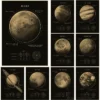|
|
|
Another Friday! Woo Hoo! Many many years ago (over 15 years ago) I visited Tahiti. I stayed on the island of Mo’orea; a small island that you can drive all the way around in about 45 minutes or so. I know, because I rented a small buggy and did just that. Tahiti is one of the most beautiful places I’ve ever had the pleasure of visiting. One of my top traveling experiences of my life. If you ever get a chance to go, you should. The night sky over the Pacific with no light polution was … stunning. It was the thing that made me understand what humans for 10s of thousands of years were seeing when they looked up at the night sky. When traveling to and from Tahiti from California, I remember it took a little more than 8 hours to get there and a little more when going back to Los Angeles. Tahiti is about half way to Australia from California. I remember thinking, how big is the Pacific ocean if it took me more than 8 hours to cross just half of it?! Well that is exactly the topic we’ll cover today. As I was researching this topic I was blown away at the actual size of the Pacific ocean… lets dive in below. Peace & Love, Billy @ Fact Brainiac P.S. Consider subscribing to the sponsor below. I’m trying to only use quality sponsors that I feel good about. They do help me pay for some of the costs of running this newsletter.
Through entrepreneurship and world-class mentors, Prequel helps middle and high school students build critical life skills not taught in school. Get our weekly insight-packed emails for ambitious teens and their parents THE PACIFIC OCEAN IS BIGGER
|
|
|
|
|
WATER, WATER, EVERYWHERE
The Pacific Ocean holds a whopping 441 million cubic miles of water. Just to give you an idea of how much that is, it’s enough to cover the entire surface of Mars and then some! And did you know that the top one-inch layer of water from all the oceans on Earth is equivalent to the amount of water in our atmosphere? It’s amazing how much water our oceans hold and how much they impact our planet’s ecosystems and climate.
25,000 ISLANDS IN THE PACIFIC
There are about 25,000 unique islands scattered across the Pacific, and many of them are just waiting to be discovered! From the breathtaking South Island of New Zealand to the dreamy paradise of Hawaii in the North Pacific, there’s something for everyone. From white-sand beaches or riding the perfect wave in these popular tourist spots. Other destinations include New Caledonia, Tonga, Samoa, and Fiji, as well as Australia’s captivating Tasmania and Japan’s picturesque Hokkaido and Honshu islands.
PLUNGING TO THE DEPTHS
The Pacific Ocean isn’t just the largest and widest ocean, it’s also the deepest. The Challenger Deep, located in the Mariana Trench, is the deepest known point on Earth, reaching down over 6.8 miles below the ocean’s surface. That’s even deeper than Mount Everest, the tallest peak on Earth, is high! The vast depths of the Pacific Ocean are home to a whole bunch of fascinating and mysterious sea creatures that scientists are still discovering.
|
|
HOME TO LIFE AND TREASURE
Our oceans, led by the mighty Pacific, make up nearly all of the living space on Earth, making them the biggest known habitats for living organisms in the universe. But that’s not all; the ocean floor is also packed with incredible artifacts and historical treasures, thanks to countless shipwrecks and underwater ruins. National Geographic estimates that there are more treasures hidden at the bottom of the ocean than in all the world’s museums combined! If you’re curious to learn more, check out Brian Haughton’s book “Ancient Treasures: The Discovery of Lost Hoards, Sunken Ships, Buried Vaults, and Other Long-Forgotten Artifacts” for a deep dive into these amazing underwater finds.
THE OCEANS ARE ACTUALLY REALLY SMALL
Most of us know that about 71% of our planet’s surface is covered in water. But even though it seems like a lot, the average depth of the oceans is only around 4.2 kilometers (2.6 miles). The Pacific Ocean’s Mariana Trench holds the record for the deepest spot, reaching about 11 kilometers (6.8 miles) below sea level.
To help you picture this, let’s use the world’s tallest building, the 829-meter (2,722-foot) Burj Khalifa, as a comparison. If the Burj Khalifa represented the distance from Earth’s core to its surface, the average depth of the oceans would be just a tiny 10-centimeter (4-inch) layer at the top. And Mount Everest? It would add another 21 centimeters (about 8 inches) above that.
Now, let’s talk about all the water on Earth. This includes not only the oceans (which make up a whopping 96.5%) but also groundwater, rivers, lakes, snow, and ice. The US Geological Survey says that if we combined all this water, it would create a sphere about 1,385 kilometers (860 miles) in diameter. To put that in perspective, Earth’s diameter is about nine times larger at 12,700 kilometers (7,900 miles). So, while our planet may seem super watery, there’s still so much more to explore!
|
|
DISCOVERING THE PACIFIC OCEAN
The enormous size and depth of the Pacific Ocean have led people to compare its exploration to that of outer space. The Pacific Ocean is truly a marvel of nature, with its incredible size, depth, and countless mysteries waiting to be explored. It’s wider than the moon, contains an unbelievable amount of water, and reaches the deepest points on Earth. Plus, the Pacific Ocean is home to so many artifacts and historical treasures that it outshines the combined collections of all the world’s museums! The Pacific Ocean is definitely a fascinating part of our planet that deserves our appreciation and wonder.
ADDITIONAL FUN FACTS
1,000 Years |
The global ocean conveyor belt is a deep ocean current that starts near Norway, circulates through the world’s oceans, and takes up to 1,000 years to complete its cycle. This process is driven by temperature and salinity differences in the water. |
3 to 1 |
For every species we’ve discovered in the ocean, there are three that are yet to be discovered. The oceans host a diverse array of life, from blue whales to microbes. Although nearly 250,000 species are identified, scientists believe over a million may exist. Ocean life thrives in extreme conditions, and the deep abyssal zone is home to a vast range of marine species, many are yet to be discovered |
Half |
of all oxygen is we breathe is produced by the ocean. Phytoplankton, tiny photosynthesizing organisms, produce most of the ocean’s oxygen and form the base of the aquatic food chain. They remove carbon dioxide from seawater and release oxygen, incorporating carbon into their bodies. |
PHOTO OF THE DAY
|
Can you name them all? answer: ossɐɔᴉԀ puɐ loɥɹɐM ʎpu∀ ‘ʇɐᴉnbsɐq lǝɥɔᴉW-uɐǝſ ‘ᴉlɐp ɹopɐʌlɐS |
Was this fact useful? Help me improve!
With your feedback, I can improve the letter. Click on a link to vote:
|
You’re receiving this email because you subscribed on FactBrainiac.com. |



